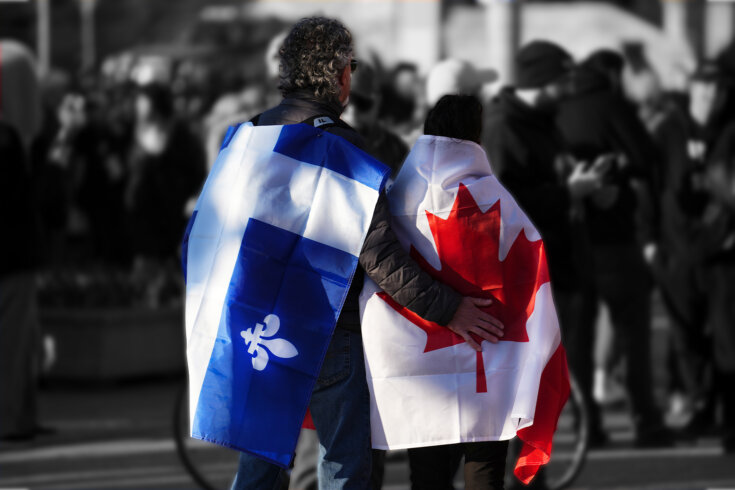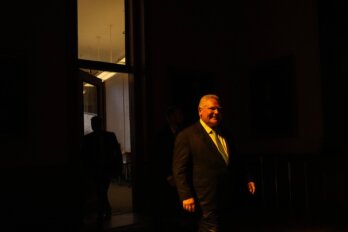“Vive le Quebec libre” was once shorthand for sovereignty, a call to chart a distinct political future for the province. But last week, as Premier François Legault shouted a version of it to a standing ovation in the National Assembly, it meant something else entirely. With US president Donald Trump threatening tariffs, Legault repurposed “Vive le Quebec” into an economic rallying cry. The province, in his framing, isn’t breaking away from Canada. It’s bracing itself against the United States.
With Trump’s new steel and aluminum tariffs set to take effect on March 12—piling onto earlier threats that were temporarily paused—Quebec’s Coalition Avenir Québec government and provincial industry leaders are preparing for the economic fallout. Legault is urging Quebecers to “roll up their sleeves” and fight back. “We have to stand up, we have to fight to protect our economy, to protect our jobs.”
Any talk of tariffs is a direct threat to Quebec’s economy, particularly in high-stakes industries like aerospace, mining, and manufacturing. The US isn’t just an important trade partner—it’s the trade partner, accounting for more than 70 percent of Quebec’s exports. In 2023 alone, Quebec sent $87.3 billion in goods south of the border, trailing only Ontario and Alberta.
Discussions on diversifying export markets are now front and centre. The Canadian Federation of Independent Business has also long been requesting that barriers to interprovincial trade be removed, including in Quebec. These barriers—differing regulations, transportation restrictions, standards, and licensing—act like a hidden tax on goods and services. Estimates from the CFIB suggest removing them could add up to $200 billion to Canada’s gross domestic product annually.
Quebec isn’t powerless in this trade war. The province supplies about 90 percent of Canada’s aluminum, making up 60 percent of all US aluminum imports. Finding a replacement at that scale won’t be easy for Washington.
Hydro-Québec president Michael Sabia has also referred to Quebec’s reservoir of cheap, clean electricity as “an advantage”, and Quebec politicians have raised the possibility of one of the largest hydropower producers in the world possibly increasing the price of its electricity exports to the US to respond to Trump’s threat of 25 percent tariffs. Quebec’s economy, innovation, and energy minister, Christine Fréchette, hasn’t confirmed moving in that direction yet.
While Fréchette has acknowledged the seriousness of the threat—estimating that exports to the US are linked to 400,000 Quebec jobs—she’s made it clear a tax on Quebec products like aluminum will penalize American consumers and businesses too. “It will be very difficult for the United States to do without us,” she said, as reported by CityNews, “especially if they no longer want to import aluminum from China.”
Legault has vowed to work closely with his federal and provincial counterparts, weighing potential countermeasures and relief programs for those facing job losses and rising costs. Options include creating “as many jobs as possible” at Hydro-Québec and fast-tracking construction projects. “No matter what Trump does, we’re going to protect you,” Legault reassured Quebecers.
Meanwhile, former Quebec economy, innovation, and energy minister Pierre Fitzgibbon suggested to The Logic that Legault may be warming to oil and gas—potentially opening the door to infrastructure projects that could reshape Alberta’s natural gas industry. This would be a notable reversal, given that the CAQ government rejected such a project in 2021 as economically risky and posing “more disadvantages than advantages.” If economic pressure mounts, Legault may have to reconsider past decisions in favour of pragmatism.
While provincial opposition parties all agree that Quebec needs to diversify, focus on supporting local businesses, and rely less on US exports, they’ve also been quick to point out that the CAQ government’s $11 billion deficit—the worst in Quebec’s history—has made the province particularly vulnerable to Trump’s threats.
The Parti Québécois, a sovereigntist party currently leading in the polls, has lobbied for a “Team Quebec” approach, with leader Paul St-Pierre Plamondon calling on Legault to create a working group of opposition politicians, experts, and interest groups to work with the government. Notably, Plamondon has also echoed Trump’s criticisms of Canadian border policy, arguing that Quebec and Canada “haven’t been good neighbours to the US” due to failures in border policing.
Quebecers, in the meantime, are responding with grassroots economic nationalism. Many are boycotting American products, asking their grocery stores to clearly identify Quebec- and Canadian-made options, and even cancelling trips across the border. The provincial government has directed the Société des alcools du Québec to remove American imports from its shelves, and the City of Montreal recently made headlines for dropping Amazon from its list of suppliers. “Despite the reprieve from customs tariffs, Montreal is not letting its guard down,” wrote mayor Valérie Plante in a social media post. “We are showing solidarity and buying local whenever possible.”
Perhaps the most unexpected effect of Trump’s threats is the shift in how Quebec sees its place in the country. While it’s expected that trade tensions would inspire flag-waving jingoism across Canada, a recent Angus Reid Institute poll shows the largest patriotic gains have been seen in Quebec. Between December and February, the share of Quebecers who said they were “very proud” or “proud” to be Canadian increased thirteen points, from 45 percent to 58 percent. When it comes to feeling a “deep emotional attachment” to Canada, Quebec, at 45 percent, again leads in gains, outpacing the 37 percent measured in 2016.
At the same time, support for Quebec sovereignty has taken a hit. A recent Leger poll shows that while the Parti Québécois continues to lead in voting intentions with 30 percent support, backing for independence has dropped to 29 percent—its lowest level in more than four years. The Quebec Liberal Party, long in decline, has rebounded, now tied for second place with the CAQ at 21 percent. Federally, the Bloc Québécois has also seen support drop by six points while the Liberals have gained seven points, tying the two parties for first place at 29 percent. If Mark Carney becomes leader, Liberal support in Quebec jumps to 38 percent.
Of course, a week is an eternity in politics, and the full impact of Trump’s chaotic reign remains to be seen, but it would be ironic if his tariff threats serve only to fray Canadian–US relations while strengthening Canadian unity.
On Friday, April 25, join us for The Walrus Talks at Home: Tariffs. Four expert speakers will discuss what the U.S. tariffs on Canada mean, both now and in the future. Join us online. Register here.





